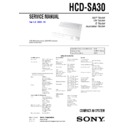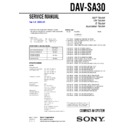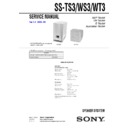Sony DAV-SA30 / HCD-SA30 Service Manual ▷ View online
HCD-SA30
AEP Model
UK Model
E Model
Australian Model
SERVICE MANUAL
COMPACT AV SYSTEM
Sony Corporation
Audio Group
Published by Sony Engineering Corporation
9-877-177-03
2004J16-1
© 2004.10
HCD-SA30 is the amplifier, DVD/SACD and tuner
section in DAV-SA30.
section in DAV-SA30.
Ver 1.2 2004. 10
Model Name Using Similar Mechanism
NEW
Mechanism Type
CDM77A-DVBU20
Optical Pick-up Name
DBU-1
SPECIFICATIONS
Amplifier section
Stereo mode
44 W + 44 W (6 ohms at
1 kHz, THD 10 %)
1 kHz, THD 10 %)
Surround mode
Front: 44 W + 44 W
Center*: 44 W
Surround*: 44 W + 44 W
(6 ohms at 1 kHz, THD
10 %)
Subwoofer*: 80 W
(3 ohms at 100 Hz, THD
10 %)
Center*: 44 W
Surround*: 44 W + 44 W
(6 ohms at 1 kHz, THD
10 %)
Subwoofer*: 80 W
(3 ohms at 100 Hz, THD
10 %)
* Depending on the sound field settings and the source,
there may be no sound output.
Inputs
VIDEO 1:
Sensitivity: 150 mV
Impedance: 50 kilohms
VIDEO 2:
VIDEO 2:
Sensitivity: 300 mV
Impedance: 50 kilohms
Outputs
VIDEO 1 (AUDIO
OUT):
OUT):
Voltage: 1 V
Impedance: 1 kilohm
PHONES:
Accepts stereo
headphones only.
PHONES:
Accepts stereo
headphones only.
Tuner section
System
PLL quartz-locked digital
synthesizer system
synthesizer system
FM tuner section
Tuning range
North American models:
Tuning range
North American models:
87.5 – 108.0 MHz
(100 kHz step)
(100 kHz step)
Other models:
87.5 – 108.0 MHz
(50 kHz step)
(50 kHz step)
Aerial
FM wire aerial
Aerial terminals
75 ohms, unbalanced
Intermediate frequency
10.7 MHz
AM tuner section
Tuning range
North American models:
Tuning range
North American models:
531 – 1,710 kHz (with the
interval set at 9 kHz)
530 – 1,710 kHz (with the
interval set at 10 kHz)
interval set at 9 kHz)
530 – 1,710 kHz (with the
interval set at 10 kHz)
Middle Easten models:
531 – 1,602 kHz (with the
interval set at 9 kHz)
interval set at 9 kHz)
Other models:
531 – 1,602 kHz (with the
interval set at 9 kHz)
530 – 1,710 kHz (with the
interval set at 10 kHz)
interval set at 9 kHz)
530 – 1,710 kHz (with the
interval set at 10 kHz)
Aerial
Loop aerial
Intermediate frequency
450 KHz
Video section
Inputs
Video: 1 Vp-p 75 ohms
Outputs
Video: 1 Vp-p 75 ohms
S video:
Y: 1 Vp-p 75 ohms
C: 0.286 Vp-p 75 ohms
COMPONENT:
Y: 1 Vp-p 75 ohms
S video:
Y: 1 Vp-p 75 ohms
C: 0.286 Vp-p 75 ohms
COMPONENT:
Y: 1 Vp-p 75 ohms
P
B
/C
B
, P
R
/C
R
: 0.7 Vp-p
75 ohms
General
Power requirements
European model:
European model:
230 – 240 V AC, 50/60 Hz
Canadian and Mexican models:
120 V AC, 60 Hz
Saudi Arabian model:
120 – 127 V, 220 V or
230 – 240 V AC, 50/60 Hz
Adjustable with voltage
selector
230 – 240 V AC, 50/60 Hz
Adjustable with voltage
selector
Voltage selector models:
120 V, 220 V or
230 – 240 V AC 50/60 Hz
Adjustable with voltage
selector
230 – 240 V AC 50/60 Hz
Adjustable with voltage
selector
Power consumption
Canadian model:
Canadian model:
80 W
Other models:
90 W
Dimensions (approx.)
355
× 75 × 360 mm
(14
× 3 × 14
1
/
4
inches) (w/
h/d) incl. projecting parts
Mass (approx.)
5.9 kg (13 lb 1 oz)
Operating temperature
5
°C to 35°C (41°F to 95°F)
Operating humidity
5 % to 90 %
Design and specifications are subject to change
without notice.
without notice.
Super Audio CD/DVD system
Laser
laser
(Super Audio CD/DVD:
λ = 650 nm)
(CD:
λ = 650 nm)
(CD:
λ = 780 nm)
Emission duration:
continuous
continuous
Signal format system
NTSC or NTSC/PAL
Frequency response (at 2 CH STEREO mode)
DVD (PCM): 2 Hz to
22 kHz (
22 kHz (
±1.0 dB)
CD: 2 Hz to 20 kHz
(
(
±1.0 dB)
Semiconductor
Harmonic distortion
Less than 0.03 %
Australian and Asian models:
230 V AC, 50/60 Hz
2
HCD-SA30
LEAKAGE
The AC leakage from any exposed metal part to earth Ground and
from all exposed metal parts to any exposed metal part having a
return to chassis, must not exceed 0.5 mA (500 microampers).
Leakage current can be measured by any one of three methods.
1.
from all exposed metal parts to any exposed metal part having a
return to chassis, must not exceed 0.5 mA (500 microampers).
Leakage current can be measured by any one of three methods.
1.
A commercial leakage tester, such as the Simpson 229 or RCA
WT-540A. Follow the manufacturers’ instructions to use these
instruments.
WT-540A. Follow the manufacturers’ instructions to use these
instruments.
2.
A battery-operated AC milliammeter. The Data Precision 245
digital multimeter is suitable for this job.
digital multimeter is suitable for this job.
3.
Measuring the voltage drop across a resistor by means of a
VOM or battery-operated AC voltmeter. The “limit” indication
is 0.75 V, so analog meters must have an accurate low-voltage
scale. The Simpson 250 and Sanwa SH-63Trd are examples of
a passive VOM that is suitable. Nearly all battery operated
digital multimeters that have a 2V AC range are suitable. (See
Fig. A)
VOM or battery-operated AC voltmeter. The “limit” indication
is 0.75 V, so analog meters must have an accurate low-voltage
scale. The Simpson 250 and Sanwa SH-63Trd are examples of
a passive VOM that is suitable. Nearly all battery operated
digital multimeters that have a 2V AC range are suitable. (See
Fig. A)
Fig. A. Using an AC voltmeter to check AC leakage.
0.15
µ
F
To Exposed Metal
Parts on Set
Parts on Set
1.5k
Ω
AC
voltmeter
(0.75V)
voltmeter
(0.75V)
Earth Ground
CAUTION
Use of controls or adjustments or performance of procedures
other than those specified herein may result in hazardous
radiation exposure.
other than those specified herein may result in hazardous
radiation exposure.
Notes on chip component replacement
• Never reuse a disconnected chip component.
• Notice that the minus side of a tantalum capacitor may be
• Notice that the minus side of a tantalum capacitor may be
damaged by heat.
Flexible Circuit Board Repairing
• Keep the temperature of soldering iron around 270˚C
during repairing.
• Do not touch the soldering iron on the same conductor of the
circuit board (within 3 times).
• Be careful not to apply force on the conductor when soldering
or unsoldering.
SAFETY CHECK-OUT
After correcting the original service problem, perform the following
safety checks before releasing the set to the customer:
Check the antenna terminals, metal trim, “metallized” knobs, screws,
and all other exposed metal parts for AC leakage. Check leakage as
described below.
safety checks before releasing the set to the customer:
Check the antenna terminals, metal trim, “metallized” knobs, screws,
and all other exposed metal parts for AC leakage. Check leakage as
described below.
Laser component in this product is capable of emitting radiation
exceeding the limit for Class 1.
exceeding the limit for Class 1.
This appliance is classified as
a CLASS 1 LASER product.
The CLASS 1 LASER
PRODUCT MARKING is
located on the rear exterior.
a CLASS 1 LASER product.
The CLASS 1 LASER
PRODUCT MARKING is
located on the rear exterior.
SAFETY-RELATED COMPONENT WARNING!!
COMPONENTS IDENTIFIED BY MARK
0
OR DOTTED LINE WITH
MARK
0
ON THE SCHEMATIC DIAGRAMS AND IN THE PARTS
LIST ARE CRITICAL TO SAFE OPERATION. REPLACE THESE
COMPONENTS WITH SONY PARTS WHOSE PART NUMBERS
APPEAR AS SHOWN IN THIS MANUAL OR IN SUPPLEMENTS
PUBLISHED BY SONY.
COMPONENTS WITH SONY PARTS WHOSE PART NUMBERS
APPEAR AS SHOWN IN THIS MANUAL OR IN SUPPLEMENTS
PUBLISHED BY SONY.
Unleaded solder
Boards requiring use of unleaded solder are printed with the lead-
free mark (LF) indicating the solder contains no lead.
(Caution: Some printed circuit boards may not come printed with
the lead free mark due to their particular size.)
free mark (LF) indicating the solder contains no lead.
(Caution: Some printed circuit boards may not come printed with
the lead free mark due to their particular size.)
: LEAD FREE MARK
Unleaded solder has the following characteristics.
• Unleaded solder melts at a temperature about 40
• Unleaded solder melts at a temperature about 40
°C higher than
ordinary solder.
Ordinary soldering irons can be used but the iron tip has to be
applied to the solder joint for a slightly longer time.
Soldering irons using a temperature regulator should be set to
about 350
Ordinary soldering irons can be used but the iron tip has to be
applied to the solder joint for a slightly longer time.
Soldering irons using a temperature regulator should be set to
about 350
°C.
Caution: The printed pattern (copper foil) may peel away if the
heated tip is applied for too long, so be careful!
heated tip is applied for too long, so be careful!
• Strong viscosity
Unleaded solder is more viscous (sticky, less prone to flow) than
ordinary solder so use caution not to let solder bridges occur such
as on IC pins, etc.
ordinary solder so use caution not to let solder bridges occur such
as on IC pins, etc.
• Usable with ordinary solder
It is best to use only unleaded solder but unleaded solder may
also be added to ordinary solder.
also be added to ordinary solder.
3
HCD-SA30
TABLE OF CONTENTS
1. SERVICING NOTE
·························································· 4
2. GENERAL
·········································································· 7
3. DISASSEMBLY
3-1. Case ··············································································· 10
3-2. HP Board, FRONT Board ············································· 11
3-3. UCOM Board ································································ 11
3-4. DMB03 Board ······························································· 12
3-5. DVD Mechanism (CDM77A-DVBU20) ······················ 12
3-6. Tray (AU) ······································································ 13
3-7. MS-128 Board ······························································· 13
3-8. Base Unit ······································································· 14
3-9. Pick-up Unit ·································································· 14
3-2. HP Board, FRONT Board ············································· 11
3-3. UCOM Board ································································ 11
3-4. DMB03 Board ······························································· 12
3-5. DVD Mechanism (CDM77A-DVBU20) ······················ 12
3-6. Tray (AU) ······································································ 13
3-7. MS-128 Board ······························································· 13
3-8. Base Unit ······································································· 14
3-9. Pick-up Unit ·································································· 14
4. TEST MODE
··································································· 15
5. DIAGRAMS
5-1. Circuit Board Location ················································ 23
5-2. Block Diagrams — RF/SERVO Section — ················ 24
5-2. Block Diagrams — RF/SERVO Section — ················ 24
— VIDEO Section — ······················ 25
— AMP Section — ·························· 26
— AMP Section — ·························· 27
— POWER Section — ···················· 28
— AMP Section — ·························· 26
— AMP Section — ·························· 27
— POWER Section — ···················· 28
5-3. Printed Wiring Board — RF Section — ······················· 29
5-4. Schematic Diagram — RF Section — ·························· 30
5-5. Printed Wiring Board — DMB Section (SIDE A) — ··· 31
5-6. Printed Wiring Board — DMB Section (SIDE B) — ··· 32
5-7. Schematic Diagram — DMB Section (1/10) — ··········· 33
5-8. Schematic Diagram — DMB Section (2/10) — ··········· 34
5-9. Schematic Diagram — DMB Section (3/10) — ··········· 35
5-10. Schematic Diagram — DMB Section (4/10) — ········· 36
5-11. Schematic Diagram — DMB Section (5/10) — ········· 37
5-12. Schematic Diagram — DMB Section (6/10) — ········· 38
5-13. Schematic Diagram — DMB Section (7/10) — ········· 39
5-14. Schematic Diagram — DMB Section (8/10) — ········· 40
5-15. Schematic Diagram — DMB Section (9/10) — ········· 41
5-16. Schematic Diagram — DMB Section (10/10) — ······· 42
5-17. Printed Wiring Board
5-4. Schematic Diagram — RF Section — ·························· 30
5-5. Printed Wiring Board — DMB Section (SIDE A) — ··· 31
5-6. Printed Wiring Board — DMB Section (SIDE B) — ··· 32
5-7. Schematic Diagram — DMB Section (1/10) — ··········· 33
5-8. Schematic Diagram — DMB Section (2/10) — ··········· 34
5-9. Schematic Diagram — DMB Section (3/10) — ··········· 35
5-10. Schematic Diagram — DMB Section (4/10) — ········· 36
5-11. Schematic Diagram — DMB Section (5/10) — ········· 37
5-12. Schematic Diagram — DMB Section (6/10) — ········· 38
5-13. Schematic Diagram — DMB Section (7/10) — ········· 39
5-14. Schematic Diagram — DMB Section (8/10) — ········· 40
5-15. Schematic Diagram — DMB Section (9/10) — ········· 41
5-16. Schematic Diagram — DMB Section (10/10) — ······· 42
5-17. Printed Wiring Board
— UCOM Section (SIDE A) — ·································· 43
5-18. Printed Wiring Board
— UCOM Section (SIDE B) — ·································· 44
5-19. Schematic Diagram — UCOM Section — ················· 45
5-20. Printed Wiring Board
5-20. Printed Wiring Board
— AMP Section (SIDE A) — ····································· 46
5-21. Printed Wiring Board
— AMP Section (SIDE B) — ····································· 47
5-22. Schematic Diagram — AMP Section (1/2) — ············ 48
5-23. Schematic Diagram — AMP Section (2/2) — ············ 49
5-24. Printed Wiring Board — I/O Section (SIDE A) — ····· 50
5-25. Printed Wiring Board — I/O Section (SIDE B) — ····· 51
5-26. Schematic Diagram — I/O Section (1/2) — ··············· 52
5-27. Schematic Diagram — I/O Section (2/2) — ··············· 53
5-28. Printed Wiring Board — VIDEO OUT Section — ····· 54
5-29. Printed Wiring Board
5-23. Schematic Diagram — AMP Section (2/2) — ············ 49
5-24. Printed Wiring Board — I/O Section (SIDE A) — ····· 50
5-25. Printed Wiring Board — I/O Section (SIDE B) — ····· 51
5-26. Schematic Diagram — I/O Section (1/2) — ··············· 52
5-27. Schematic Diagram — I/O Section (2/2) — ··············· 53
5-28. Printed Wiring Board — VIDEO OUT Section — ····· 54
5-29. Printed Wiring Board
— PHONES, LOADING Section — ·························· 55
5-30. Schematic Diagram
— PHONES, LOADING Section — ·························· 56
5-31. Printed Wiring Board — CONTROL Section — ······· 57
5-32. Schematic Diagram — CONTROL Section — ·········· 58
5-33. Printed Wiring Board — POWER Section — ············ 59
5-34. Schematic Diagram — POWER Section — ··············· 60
5-35. IC Block Diagrams ····················································· 63
5-36. IC Pin Function Description ······································· 70
5-32. Schematic Diagram — CONTROL Section — ·········· 58
5-33. Printed Wiring Board — POWER Section — ············ 59
5-34. Schematic Diagram — POWER Section — ··············· 60
5-35. IC Block Diagrams ····················································· 63
5-36. IC Pin Function Description ······································· 70
6. EXPLODED VIEWS
6-1. Case Section ································································ 82
6-2. Front Panel Section ····················································· 83
6-3. Chassis Section ···························································· 84
6-4. DVD Mechanism Section (CDM77A-DVBU20) ········ 86
6-2. Front Panel Section ····················································· 83
6-3. Chassis Section ···························································· 84
6-4. DVD Mechanism Section (CDM77A-DVBU20) ········ 86
7. ELECTRICAL PARTS LIST
······································· 87
4
HCD-SA30
NOTES ON HANDLING THE OPTICAL PICK-UP BLOCK
OR BASE UNIT
OR BASE UNIT
The laser diode in the optical pick-up block may suffer electrostatic
break-down because of the potential difference generated by the
charged electrostatic load, etc. on clothing and the human body.
During repair, pay attention to electrostatic break-down and also
use the procedure in the printed matter which is included in the
repair parts.
The flexible board is easily damaged and should be handled with
care.
break-down because of the potential difference generated by the
charged electrostatic load, etc. on clothing and the human body.
During repair, pay attention to electrostatic break-down and also
use the procedure in the printed matter which is included in the
repair parts.
The flexible board is easily damaged and should be handled with
care.
NOTES ON LASER DIODE EMISSION CHECK
The laser beam on this model is concentrated so as to be focused on
the disc reflective surface by the objective lens in the optical pick-
up block. Therefore, when checking the laser diode emission,
observe from more than 30 cm away from the objective lens.
the disc reflective surface by the objective lens in the optical pick-
up block. Therefore, when checking the laser diode emission,
observe from more than 30 cm away from the objective lens.
LASER DIODE AND FOCUS SEARCH OPERATION
CHECK
CHECK
Carry out the “S curve check” in “CD section adjustment” and check
that the S curve waveform is output several times.
that the S curve waveform is output several times.
JIG ON REPAIRING
When repairing this set, etc., connect the extension cable as the
figure shown below.
figure shown below.
MODEL IDENTIFICATION
— BACK PANEL —
Part No.
Model
E, Hong Kong models
Mexican model
AEP, UK models
Singapore model
Australian, Korean models
Taiwan model
Saudi Arabia model
Canadian model
Russia model
PARTS No.
4-243-623-0
s
4-243-623-1
s
4-243-623-2
s
4-243-623-3
s
4-243-623-5
s
4-243-623-6
s
4-243-623-7
s
4-243-623-8
s
4-243-623-9
s
SECTION 1
SERVICING NOTE
NOTES ON DMB03 BOARD EXCHANGE
If a DMB03 board is exchanged, “DRIVE AUTO ADJUSTMENT”
may be unable to be performed. In this case, initialize a memory in
the following procedure.
may be unable to be performed. In this case, initialize a memory in
the following procedure.
1. Starting Test Mode (see page 15).
2. Press the 2 button of remote commander to set the Drive
2. Press the 2 button of remote commander to set the Drive
Manual Operation (see page 17).
3. Press the 6 button of remote commander to set the Memory
Check (see page 19).
4. Press the [CLEAR] button of remote commander to initialize
a memory.
AUTO SERVO ADJUSTMENT
After parts related to the servo circuit (RF amplifier (IC001), DSP
(IC509), motor driver (IC501), EEPROM (IC903) so on) are
replaced, re-adjusting the servo circuit is necessary. Select “ALL”
at “1. DRIVE AUTO ADJUSTMENT” (Refer to page 16 in TEST
MODE) and adjust DVD-SL (single layer), CD and DVD-DL (dual
layer).
(IC509), motor driver (IC501), EEPROM (IC903) so on) are
replaced, re-adjusting the servo circuit is necessary. Select “ALL”
at “1. DRIVE AUTO ADJUSTMENT” (Refer to page 16 in TEST
MODE) and adjust DVD-SL (single layer), CD and DVD-DL (dual
layer).
RFMON signal waveform
• Standard value
Test Disc
RFMON level
Standard Value
DVD
TDV-520CSO
1.09
±
0.2Vp-p
(J-2501-236-A)
CD
LUV-P01
1.05
±
0.2Vp-p
(4-999-032-01)
VOLT/DIV: 200 mV
TIME/DIV: 500 ns
TIME/DIV: 500 ns
RFMON level
RFMON Level Check
Perform a RFMON level check before exchanging optical pick-up.
Measurement Point: DMB03 board CN901
1pin (RF) — 3pin (GND)
Ver 1.2



